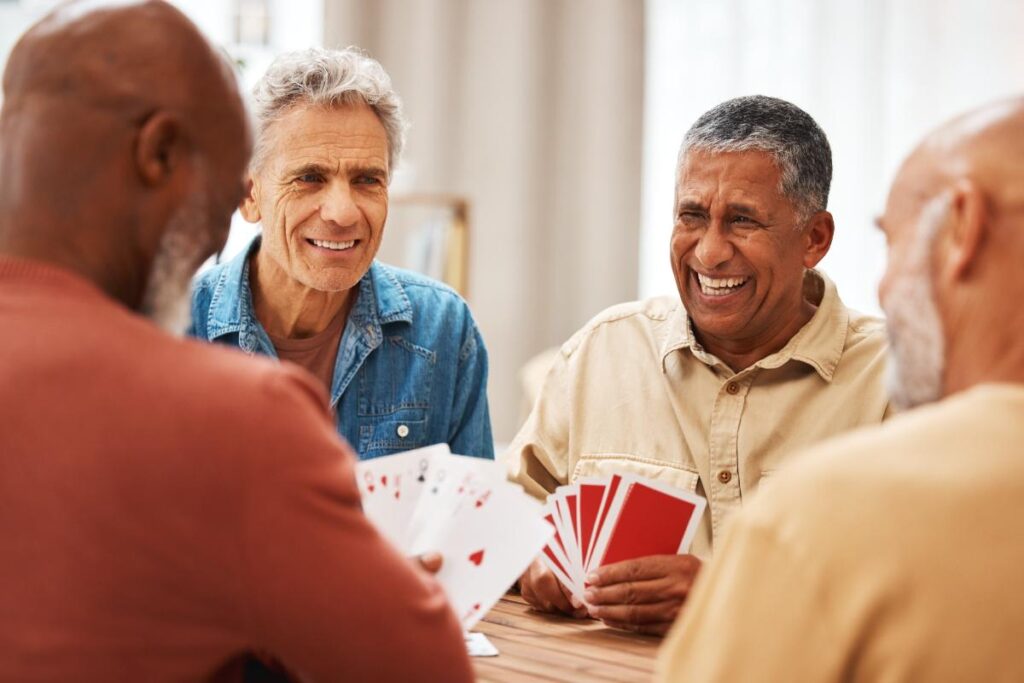How to preserve memory in seniors is something everyone thinks about as they grow older. Are there tricks to keeping the brain youthful? What can be done to prevent dementia? What games or hobbies will preserve memory in seniors? Though there are numerous brain games that people use to stay mentally fresh, and staying physically healthy is a fundamental factor in memory, one of the best ways to stay mentally youthful is social interaction. Keeping your relationships with friends and family healthy can help your memory stay healthy. At Buckner Retirement Services, we provide quality senior memory care. As a result, we understand a great deal about how people in retirement can protect their memory.
If you are interested in the benefits of senior social interaction on memory or would like to learn more about how to remain cognitively fit as you age, reach out to Buckner Retirement Services today by calling 214.227.7182. We can answer questions and provide you with some helpful tips.
How Social Interaction Can Help Preserve Memory in Seniors
The number one benefit most commonly listed for staying socially active throughout life is to slow memory impairment and cognitive decline. The benefits are clear—social connections and strong interpersonal relationships have a powerful effect on memory. In fact, there is some evidence that socializing can actually improve cognition in seniors for whom there has been a decline in memory and mental acuity.
Some of the ways that socializing improves brain function and memory include:
- Helping the brain maintain focus – A focused mind stays healthier and has improved memory and cognition. Watching TV or observing others socialize does not have the same effect on focus as conversing, interacting, responding, and connecting.
- Stimulation while socializing – Mental agility can be maintained and even improved through the stimulation provided by social interaction and meaningful relationships. An active, stimulated mind is less likely to slide quickly into memory loss.
- Preventing isolation and depression – Feeling connected keeps the brain awake and healthy. Socializing can trigger the brain to produce the positive hormones and neurotransmitters that lead to well-being and pleasure—as well as brain health.
- Brain-derived neurotrophic factor (BDNF) – is a protein in the brain and spinal cord that triggers neurons to develop and survive. It turns out social interaction increases the expression of this protein, positively affecting many brain functions, including memory.
Relationships that are meaningful and lasting, with deep and multi-faceted points of contact, tend to be the kind of interactions that are most impactful on memory. Staying connected with friends, old and new, family members, and people who are meaningful to you is a wonderful way to stay happy, engaged, connected, and focused, all of which improves and maintains memory in seniors.
The Benefits of Senior Social Interaction
There are many benefits to socializing among seniors. In addition to helping slow memory decline and often actually improve memory, interpersonal relationships and social opportunities also:
- Help maintain a sense of personal identity, which is integral to memory and life satisfaction
- Improve quality of life, including the experience of joy and fun
- Prevent the depression that comes quickly with isolation and loneliness and thus improving overall well-being
- Improve the quality of physical health as well, such as hypertension and heart disease
If you are concerned about memory loss for yourself or a loved one, call Buckner Retirement Services today. Consider a community with many opportunities for physical and mental activities and where there is a wide range of people with whom to socialize and engage over dinner, in book clubs, or while taking walks.
Call Buckner Today for Senior Memory Care Options
Reach out to Buckner Retirement Services for more information about how social interaction can help preserve memory in seniors. We are happy to provide the support you need and connect you to research or professionals who can help you understand memory and aging.
It’s easy to connect with us. Just submit our online contact form or call us at 214.227.7182.

